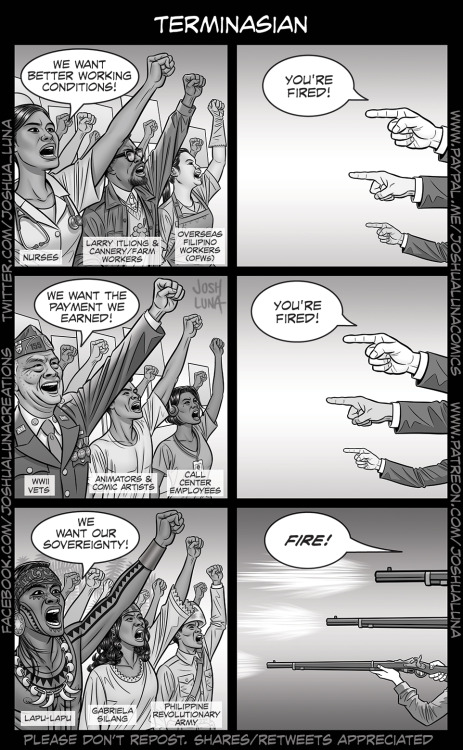#larry itliong
Filipino United Farm Workers Union (UFW) supporters picket outside of a California Safeway store, February 1973. The UFW union reached a three-year contract with major grape growers in 1970 after years of struggle and a nationwide grape boycott. However, in 1973 when the contracts expired, major grape growers signed “sweetheart” contracts which the UFW responded with strikes and a nationwide boycott of lettuce and grapes.
The whole movement began in Coachella in the summer of 1965 when a group of Filipino workers went on strike demanding that their wages be increased from $1.10 an hour as well as better living conditions. After a succesful first strike they did it again, but this time in Delano where wages were also starting at $1.10 an hour. However, the struggle became a lot harder when the growers were very successful in dividing and creating conflict between Mexican and the Filipino workers.
Larry Itliong and Andy Imutan, leaders of the largely Filipino Agricultural Workers Organizing Committee (AWOC), decided to take action by seeing Cesar Chavez, the leader of the National Farm Workers Association (NFWA). It took several discussions and a lot of faith, but finally the Filipinos and Mexicans joined as one on September 16, to picket the Delano growers. A few months later AWOC and NFWA joined together as the United Farm Workers.
Post link
(Please don’t repost or edit my work. Reblogs are always appreciated. Support my work here: https://www.patreon.com/joshualuna)
History has shown Filipinx are valued for our labor, not our voices. But the only thing more consistent than our exploitation and oppression is our resilience in the face of it. #FilipinoAmericanHistoryMonth
There are many horror stories about Filipinx being mistreated. Whether working in our home countries or as Overseas Filipino Workers (OFWs), we’re treated as a servant class no matter where we are—suffering long hours, low wages and benefits, and intentionally dehumanizing treatment.
For example, in 2019, a Filipina maid in Saudi Arabia was tied to a tree as “punishment” by her employers. An animator in the Philippines was fired for demanding a full-time salary for his full-time work. Filipina nurses who tried to quit an abusive New York nursing home got stuck in indentured servitude. Out of 66 US allies in WWII, only Filipino vets were denied payment and benefits that the US promised. Call center employees working as outsourced low-wage labor for US corps who’ve earned promotions and higher pay are given unrealistic quotas to get them fired. The list goes on.
I even experienced this myself in May, when I lost my publisher of 10+ years for—ironically—talking about the racism and oppression Filipinx and other Asians face. They were happy to publish my stories centering non-Filipinx, but not when I decided to center myself and other Fil-Ams.
In my industry (comics), the exploitation of Filipinx is a well-kept secret. In a recently released video by DC Comics—which was meant to highlight Filipinx creators—they inadvertently admit to hiring Filipinx only to circumvent paying striking American creators better wages.
But Filipinx don’t stay silent, we fight back. From legendary Lapu-Lapu, Gabriela Silang, and the Katipunan—who resisted Spanish colonization and fought for independence—to Fil-Am labor leader Larry Itliong, Filipinx have a long tradition of organizing protests and revolutions.
Yet when we do speak up, our contributions can still be erased—sometimes by other POC. Itliong spearheaded a highly effective labor movement in the 30s and 40s when he organized the Delano grape strike and unionized laborers, but his work is often credited solely to César Chávez. A search for Itliong’s name will result in articles and books that always acknowledge his collaboration with Chávez. But if you search for Chávez’s name, Itliong is rarely mentioned. This erasure hurts even more so because the whole movement was about solidarity between Mexican-Americans and Fil-Ams.
What this means is Filipinx are seen as exploitable labor by pretty much everyone: whites, other POC, even our own. That’s why a major part of the Philippines’ economy relies on remittances from OFWs sending their earnings home—one of the country’s biggest exports is people.
So on this last day of #FilipinoAmericanHistoryMonth, let’s all commit to fighting racial and class injustice, uplifting Fil-Am and Filipinx voices, and recognizing Filipinx contributions all year-round.
If you enjoy my comics, please pledge to Patreon or donate to Paypal. I recently lost my publisher for trying to publish these strips, so your support keeps me going until I can find a new publisher/lit agent.
https://twitter.com/Joshua_Luna/status/1134522555744866304
Happy Birthday to Fil-Am hero, Larry Itliong, who gave America the finger. (Three, in fact, which he lost in a cannery accident.)
Post link


